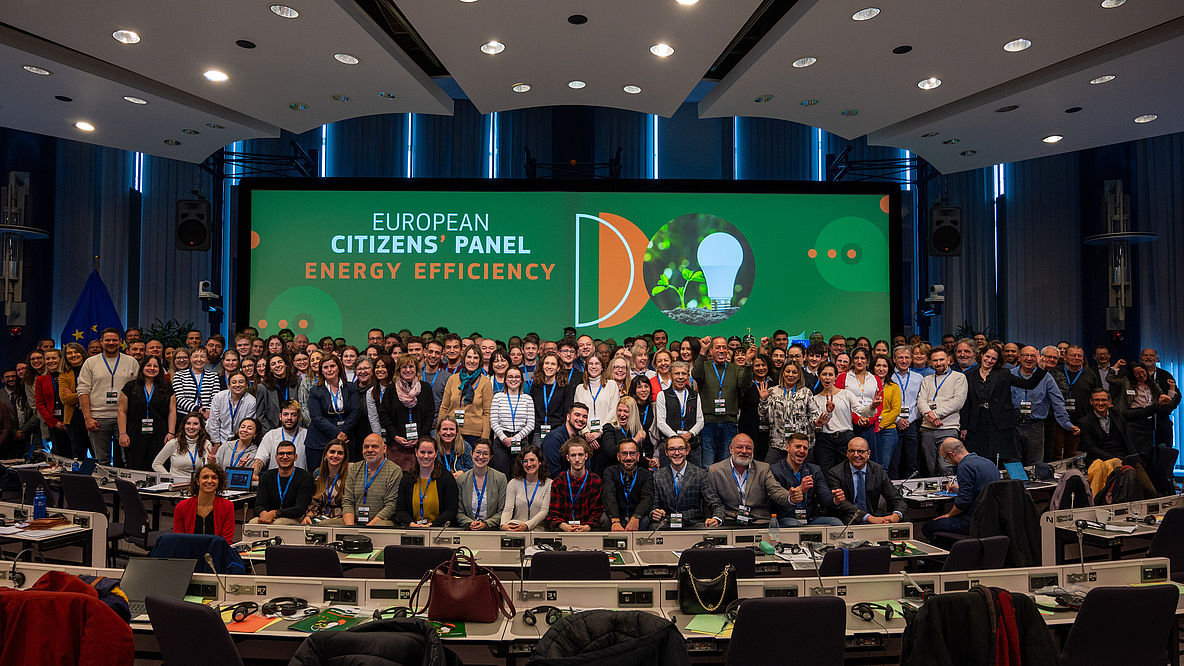Energy efficiency: EU to become a global role model

Renewable energies, transport, buildings and education - on 14 April 2024, the EU Citizens' Panel on Energy Efficiency adopted 13 recommendations.
On three weekends in February, March and April 2024, 150 randomly selected citizens from each of the 27 EU Member States came together in Brussels to formulate, with the help of experts, concrete recommendations to one of the key initiatives of the 2024 Commission work programme. They brought in a citizens' perspective on how to increase energy efficiency.
Energy efficiency generally describes the ratio of a certain benefit - for example the provision of light or heat - to its energy consumption. The less energy is used, the more energy-efficient a product or service is.
Making local public transport more attractive
In order to use energy more effectively, the participants in the citizens' panel suggest making public transport more attractive. "Get goods off the road, get people out of planes, and introduce a 'railway first principle'", demand the panel participants.
The EU should expand measures for greater energy efficiency in buildings, ensure a better supply of qualified labour in the field of energy efficiency and invest in green education. The implementation of EU directives for greater energy efficiency should be ensured by monitoring their implementation.
Supporting energy cooperatives
The European Union should also support its citizens in setting up energy cooperatives focussed on energy efficiency and in the energy-efficient renovation of houses. Energy should primarily be generated locally and consumers should be empowered to act in an energy-efficient manner. The energy network is to be optimised and expanded from the producer to the end consumer in favour of renewable energy sources. Overall, the Citizens' Panel wants the EU to increase its energy independence and efficiency so that it can serve as a role model worldwide.
Participants were enthusiastic about the citizens' panel. Julia from Latvia said: "It was a very interesting journey, because the biggest part of us started with thinking it was basically a scam, so we came with rather negative feelings about all of that and we started in the beginning with discussing the problems, and it was all bad, bad, bad.
"I haven't expected anything like that"
And then suddenly we started thinking about how we can improve that. We finalized that into some kind of real recommendations we could give to the European Commission. And we went from total minors to something very interesting, to something, we could really influence our lifes with. For me that was personally an enormous journey and I haven't expected anything like that in the end and I'm very excited about that."
The European Commission welcomed the recommendations on energy efficiency. "Energy efficiency is good for the planet, good for the EU’s energy security, and good for a household budget. I was glad to receive a report by this green citizens’ dialogue. It is an important way to engage and a valuable input for our efforts", Maroš Šefčovič, Executive Vice-President for European Green Deal, Interinstitutional Relations and Foresight, said.
Platform for citizen participation
Parallel to the Citizens' Forum, the EU invited its citizens to participate online. How can Europeans use energy more sparingly and do more with less energy in our everyday lives? How can we reduce our electricity bills? How can we make our homes more energy efficient? What does the EU need to change in terms of energy to protect our planet? EU citizens were able to contribute their ideas on the subject of energy efficiency on an online platform.
The input gathered from both the Panel and the Citizens' Engagement Platform will now feed into a Commission Recommendation on the “Energy Efficiency First” principle to be considered by the College of Commissioners and ultimately addressed to the Member States later this year.
Diversity of EU population reflected
The recruitment of the panel participants was carried out by the European Commission’s contracting partners, Harris Interactive and Le Terrain research institutes. They found citizens as Panel participants who reflect the diversity of the EU population.
Citizens' Panels bring together randomly-selected citizens from all 27 member states to discuss - at European level - key, upcoming proposals that affect all inhabitants.
Recommendations for the European Commission
European citizens’ panels see participants working together in small groups (each of around 12 people) and all together (in plenaries). A facilitation team provides support. Based on the discussions, citizens make recommendations for the European Commission to consider when defining policies and initiatives.
Participants of citizens’ panels are recruited through random selection. Potential participants are contacted by telephone. Recruiters use tools that generate valid telephone numbers at random (including both mobile and fixed line telephone numbers). This way a diverse, representative group can be reached.To ensure that panels reflect as far as possible the EU’s socio-demographic composition, the process ensures that recruitment is representative.
Data from the following sources are combined to obtain participants:
- Eurobarometer, the annual European Union public opinion survey, and
- Eurostat, the EU’s statistics office
Quota system
A quota system ensures a gender-balanced panel, and specifies that young people aged 16-25 represent a third of the panel. Other socio-demographic characteristics we take into account relate to:
- education level
- geographic location
- occupation
Participants from each member state are recruited in proportion to that member state’s population, while ensuring proportional representation across different groups. For smaller countries with fewer participants, the categories are covered across panels, so that smaller countries are represented. The selection process is completely renewed for each new panel.
Read more